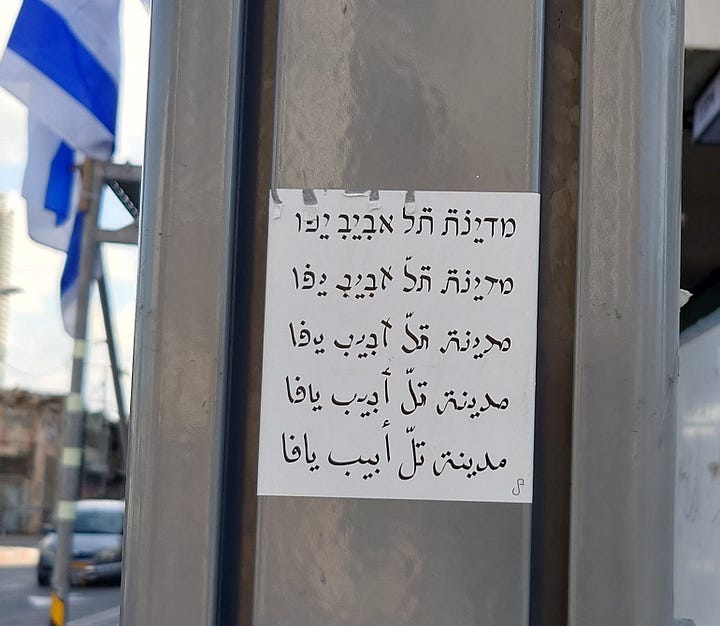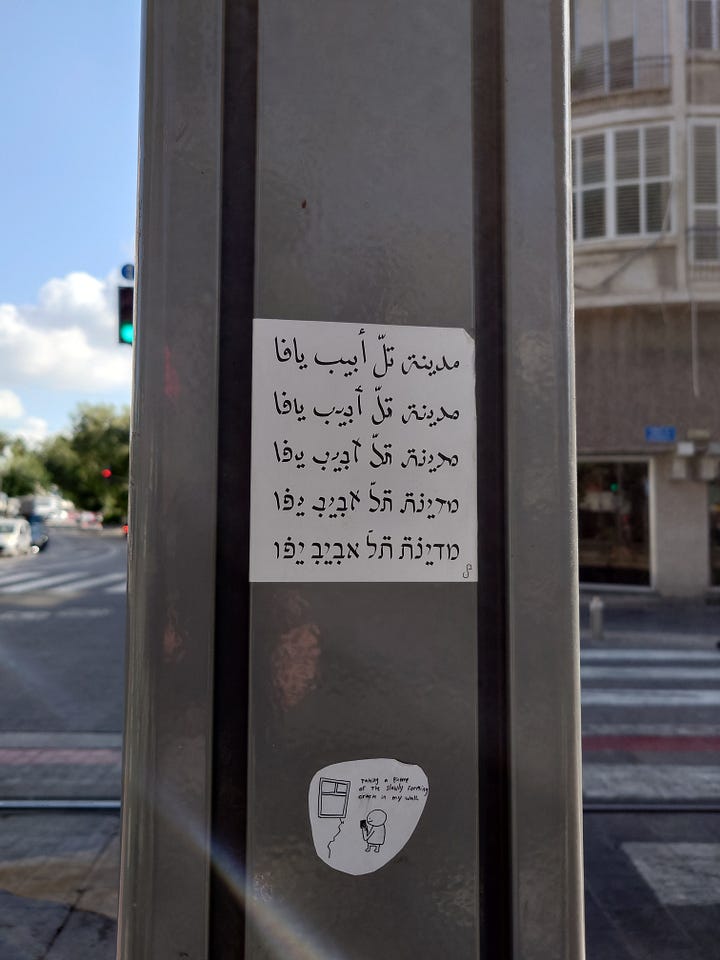(This post was edited after it was sent by email. A Yuval Harari essay was linked in the original email. It is still linked, below, and now an excerpt from that essay is included below.)
Spent Shabbat in Jerusalem. Back in Tel Aviv for Hebrew class, which moved from Zoom to in person.
Byword for the day: We Don’t See Things As They Are, We See Them As We Are.[1]
Seen
Shellshock: Sorrow, worry, disorientation written on the faces of many. People of my generation have children in the military. I see three kinds of worry:
What danger will my child encounter?
What horror will my child see?
Will this end? What comes next?
Signs all over: "The City of _____ is here for you. Call the hot line ____"
In Jerusalem, the U.S. Ambassador's residence is in the German Colony. A giant image of President Biden (who had just visited the day before) was defaced with swastikas. (Can't tell you if it was done by far right Jews [a chunk of whom are virulently anti-American] or Arab Israelis. Only saw the aftermath.)
I have not been volunteering the past few days. Here is what the hotel hosting displaced families from the south area looked like today:
Read
The news is only bad. Harari, author of Sapiens (etc.) published a profound essay in the Washington Post on the topic: "War is the continuation of politics by other means." If you read one thing this week, this is a good candidate. At the Washington Post (if that needs credentials here is a PDF). Small excerpt:
As for this world, according to the views of Hamas and other fundamentalist Muslim groups, the only viable aim for a human society on Earth is unconditional adherence to heavenly standards of purity and justice. Because peace always involves compromises on what people consider justice, peace must be rejected, and absolute justice must be pursued at any cost.
This, by the way, explains a curious recent phenomenon among the radical left in many Western democracies, including some student organizations at Harvard University. They absolve Hamas of any responsibility for the atrocities committed in Be’eri, Kfar Azza and other Israeli villages, or for the humanitarian crisis in Gaza. Instead, these organizations place 100 percent of the blame on Israel.
The link between the radical left and fundamentalist organizations such as Hamas is the belief in absolute justice, which leads to a refusal to acknowledge the complexity of realities in this world. Justice is a noble cause, but the demand for absolute justice leads inevitably to endless war. In the history of the world, no peace treaty has ever been reached that didn’t require compromise or that provided absolute justice.
Background
Three stories in a context-creation attempt (note, it is not always clear to me when to say “Palestinian” and when to say “Arab Israeli” — this is my best estimate):
Several years ago, a friend working at a tech firm in Haifa told me how he joked with Arab Israeli guys on the team: "Look, I don't know _anyone_ who voted for Bibi (Netanyahu), but he won the election, so it was you guys, right? You voted for him?"
When I arrived a year ago, I considered an apartment in a fancy high rise. Pool, gym, 24x7 security, the works. [Ended up in an old building—funky in every way, but the apartment itself is up to date.] My acquaintance at the fancy place told me of meeting a software engineer in the sauna. Fellow resident. They were there shvitzing, talking. The engineer is Palestinian.
Palestinians/Arab Israelis who are queer or trans often end up in Tel Aviv. It is typically not tenable for them to remain in their home communities (c.f. Slicha Al Shaila episode on Youtube, has English subtitles-- may require VPN to Israel)
Tribalism
My point: Society here is very stratified. (The world is a very tribal place — the U.S. West Coast is atypical.) There is vanishingly little contact across ethnic lines. I buy nuts and vegetables from Palestinian vendors, and in the year I've been here had coffee exactly once with someone who grew up in an Arab town in the north. (And can't continue living there due to sexual identity.)
While social stratification is real, at the same time there is much integration in the economy and workplace. A (now former) senior member of the Jerusalem Mayor's office told me that more than 30% of the Jerusalem Police Force are Arab Israelis.
Heard
There is a layer that I have avoided writing: What people (Jewish Israelis) say about Palestinians and Arabs. A high school student at yesterday's shabbat table changed my mind. The adults at the table (five of them) were at a loss. What this fifteen year old said:
"I volunteer in Kids for Peace, part of Seeds for Peace. It's supposed to be 50-50, but there are only five Jewish kids to 20 Palestinian because there aren't enough Jewish kids interested. After the attacks, some of the Palestinian kids denied that anything bad happened, and some celebrated Hamas."
This by itself is troubling, but it is consistent with other reports. Including educated Palestinians who hold that nothing bad occurred and the whole situation is Israeli propaganda, not a Hamas attack. (This related by a Jewish Israeli in her 50's who has been very close since college years with the Palestinian woman who feels this way.)
Other Perspectives
In the days after the attack, a college aged woman active for years in Israeli-Palestinian dialog reported that two Israeli Palestinians were at the music festival and were taken hostage. This was, to me, hearsay. Until I sat face to face with a woman who has twice-a-week meetings with a college age Palestinian man who reports: He was at the music festival. He saw what happened. He managed to get home, and is enraged both at the attackers and at the denial and celebration within his community. (He also must remain silent, because his attendance at an “Israeli” event is not acceptable in his community.)
Relief Area
Alef
Americans often ask: How is it living in Israel? I respond: I live in Tel Aviv. It happens to be in Israel, but is its own thing. There is actually a phrase "The Country of Tel Aviv." (Also described as the "Anti-Jerusalem.")
One way this is experienced is the percentage of shoppers who say Thank You in Arabic when shopping.
I saw this on a sticker in Jaffa a few days ago. "The Country of Tel Aviv-Yafo" morphing from Arabic to Hebrew, and the other way 'round:


Bet
In the "distraction" category, watching: Woody Allen films and the TV show “Broad City.” (Takes a few episodes to get in the groove.)
I've been reading Shalev's book "My Russian Grandmother and her American Vacuum Cleaner." Also Bourdain's Kitchen Confidential and, for fiction, FUP. (These last two are re-reads.)
(Did you know the English word “jennet” means “female donkey?” Until today, I didn’t.)
Gimmel
This from an college student in NYC. At first I understood it at a simple “pshat” level: Why would a (queer) person who would be rejected by a community (Palestinian cities and towns) advocate for that community? After reading Harari’s piece mentioned above, perhaps I understand it better.
That is today.
Raf
[1]
Attributed variously to Anais Nin, Talmud Berahot 55b (Raf looked, but didn't spot it), and other sources.




